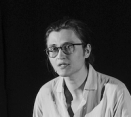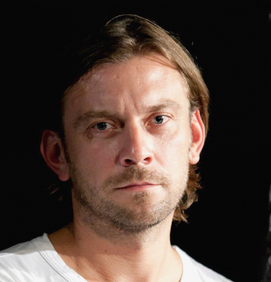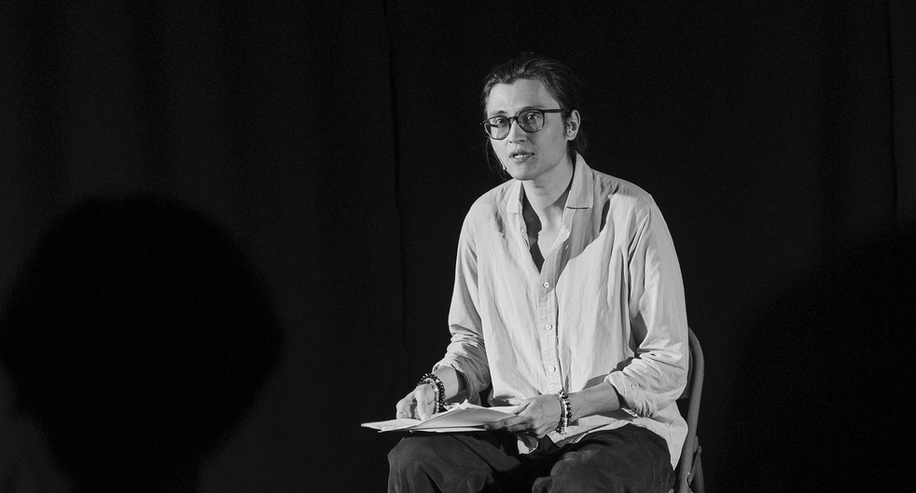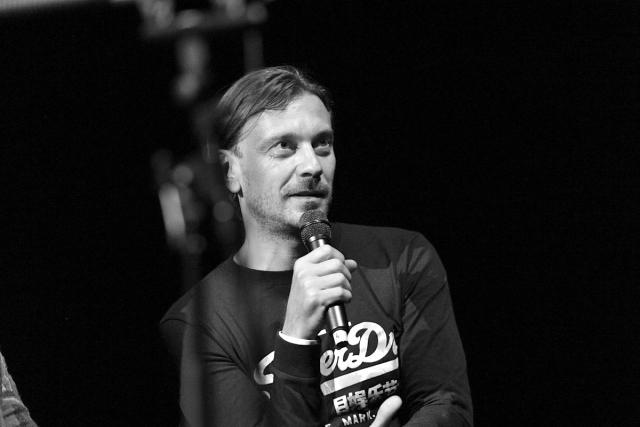Aleksandr Plotnikov, Mikhail Durnenkov
Author Readings
Photo: Tatyana Lavrenteva, Yuri Korotetsky
Duration: 2h 45 min with intermission
Language: Russian with German subtitles
HAU Hebbel am Ufer (HAU3)
Tempelhofer Ufer 10, 10963
Part 1:
Alpha Centauri
Aleksandr Plotnikov - playwright, reader
Duration: 55 min
Part 2:
Something about Navalny
Mikhail Durnenkov - playwright, reader
Duration: 90 min
In cooperation with HAU Hebbel am Ufer
Every author — whoever they are — has a unique relationship with their own text. They understand it differently from how it might be heard or interpreted by an actor, a director, or any outside reader. In 2025, the Voices Berlin Festival has chosen a new format for its play readings: every piece will be performed by its author.
Part 1: Aleksandr Plotnikov "Alpha Centauri"
The play "Alpha Centauri" speaks about those who are not usually spoken of. It tells the stories of Soviet cosmonauts who never made it to space — Sergey Kartashov, Valentin Varlamov, Dmitry Zaikin, Vitaly Bondarenko, Sergey Nefedov. Each of them could have been in Gagarin’s place, but a chain of impossible, monstrous coincidences and circumstances robbed them of that chance. And for some, even of life itself. Is there a place for them in the present? For us? For all those who ended up somewhere they never wanted to be? For those cast aside, erased by time, stripped of their dreams and their voice? And how does this eternal triumph — be it the triumph of war or the conquest of space — shape our political consciousness today?
The play by Aleksandr Plotnikov doesn't provide answers, but it offers a perspective on defeat as a way to think about time itself. It's a sensitive discussion, a return of names, a poetic speech that interrupts historical silence.
Part 2: Mikhail Durnenkov "Something about Navalny"
Over his 48 years, Navalny was an opposition politician, a revolutionary, and the founder of the Anti-Corruption Foundation. He was the poisonous sting that pricked the authorities and exposed the vulnerability of a totalitarian system. A masterful trickster, he inspired people with the words: “I am not afraid, and you should not be afraid either.”
Navalny had many faces. There are thousands of witnesses — those who worked with him, fought against him, loved him, and hated him. Each has their own, true Navalny. That is why this legendary story can only be told as a polyphony — an ancient Greek chorus, a thousand-faced witness to great events.
In Mikhail Durnenkov’s play, dozens of testimonial voices share with the audience their personal truths about Navalny. None claim to be exhaustive or to capture the full scope of the late politician’s personality. Yet each contributes a fragment of the mosaic that, taken together, forms an epic portrait of Alexei Navalny.
Contributors

aleksandr plotnikov
director, playwright
Born in Moscow in 1995. Studied at the Screenwriting and Film Studies Faculty VGIK (Department of Film Drama, workshop of Ibragimbekov) and in the directing group of the Acting Faculty (workshop of Kama Ginkas) of the Higher School of Performing Arts in Moscow. Started working at theatre in 2019. As a theatre-worker Plotnikov was dealing with the issues of post-memory. Blending poetical attitude and documental approach, he explored Reparative Aesthetics, that tends to restitute and recompense atrocities and injustice of the past through docufiction artworks. In the play “Aphasia” that was eventually banned due to political reasons, he told the story of his Ukrainian grandfather, who was subjected to an illegal medical procedure after Chernobyl.
Some of Plotnikov's works were highly appreciated by the Russian pre-war theater community. The performance of "Anna Karenina" at the Krasnoyarsk Theatre had six nominations in the National Theater Awards "Golden Mask" and won the prize in the category "Best Supporting Actress."Residing in Armenia, Plotnikov continues to explore the possibilities of modern theater, currently dealing with the unbearable grief of the present.

mikhail durnenkov
playwright
Mikhail Durnenkov is a Russian-born playwright, screenwriter, and theater pedagogue. His plays have been staged at prestigious theaters in Russia — including the Moscow Art Theater, the Alexandrinsky Theater in St. Petersburg, the Gogol Center, and the Moscow State Theater of Nations — as well as in Warsaw, Vilnius, Tallinn, Prague, London, Glasgow, and Plymouth. Durnenkov has received numerous awards for his work; in 2019, he won the prestigious Russian theater award, the Golden Mask, for his play "Utopia". He was also a member of the theater collective Teatr.doc and a regular participant in the Liubimovka Festival, dedicated to promoting young Russian playwrights. For several years, he was active in the festival’s artistic direction.
His plays have been translated into multiple languages. Beyond Russia, he has collaborated with the Royal Shakespeare Company, London’s Royal Court Theatre, and the Lark Play Development Center in New York, among others. He was also a guest at the New Plays from Europe Theatre Biennale at the Wiesbaden State Theatre.
After his public opposition to Russia’s invasion of Ukraine, his plays were banned in Russia. He also lost his teaching position at the Moscow Art Theatre School and was forced to flee to Finland with his family.

